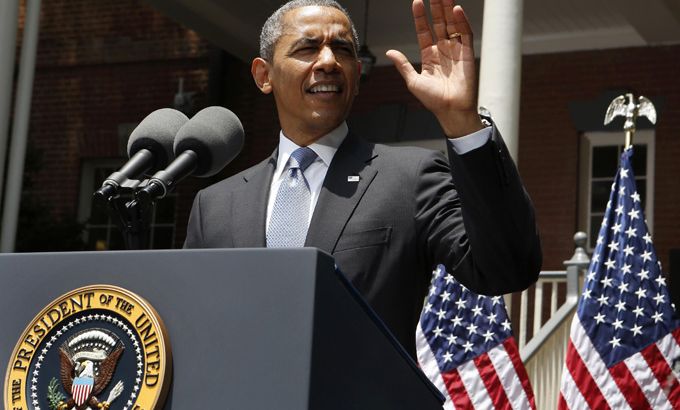Obama plan promises greener future
Critics say president’s measures to tackle pollution and global warming will cost US jobs when it can least afford it.

US President Barack Obama has unveiled his plan to tackle pollution and global warming, but the controversial plan has already been criticised by opponents who say it will cost jobs when the country can least afford it.
Obama ordered his administration on Tuesday to end the practice of coal-fired power plants dumping unlimited carbon dioxide emissions into the atmosphere, moving to deliver on one of his major goals in office.
Keep reading
list of 4 itemsThis researcher found billions in ‘invisible’ gold in Jo’burg’s mine dumps
Are seed-sowing drones the answer to global deforestation?
Rainfall set to help crews battling wildfire near Canada’s Fort McMurray
“As a president, as a father and as an American, I’m here to say we need to act,” he said at a speech at Georgetown University in Washington, where he announced the first-ever federal regulations on heat-trapping gases emitted by new and existing power plants.
He also said that the controversial oil pipeline project from the Canadian tar sands in Alberta to refineries in Texas should only be approved if it does not “significantly exacerbate” carbon pollution.
Obama highlighted America’s strengths, research, technology and innovation, as factors that make the US uniquely poised to take on the challenges of global warming.
He mocked those who deny that humans are contributing to the warming of the planet, adding that he “doesn’t have much patience” for anybody who refuses to acknowledge the problem.
“We don’t have time for a meeting of the flat-earth society,” he said.
Controversial pipeline system
Environmental activists have demanded that Obama’s administration not approve the Keystone XL pipeline, while Canada’s leaders have pushed for its approval.
“Allowing the Keystone pipeline to be built requires a finding that doing so would be in our nation’s interest. And our national interest will be served, only if this project does not significantly exacerbate the problem of carbon pollution,” he said.
|
|
| Inside Story Americas – The mess that oil made |
Environmentalists acknowledged the remarks, noting it was the first time the administration had directly linked approval of the pipeline to its effect on pollution.
Republican critics in Congress called Obama’s plan a job-killer that would threaten the economic recovery.
“It’s tantamount to kicking the ladder out from beneath the feet of many Americans struggling in today’s economy,” Mitch McConnell, the Senate minority leader, said.
Obama dismissed the critics, saying, “That’s what they said every time. And every time, they’ve been wrong.”
The White House has insisted the State Department is making the decision independently, but Obama said on Tuesday that he is instructing the department to approve it only if the project would not increase overall, net emissions of greenhouse gases.
Other parts of Obama’s plan will boost renewable energy production on federal lands, increase efficiency standards and prepare communities to deal with higher temperatures.
‘Too little, too late’
Obama has pledged to work with major polluting countries like China and India to curb emissions, building on an agreement he struck recently with China’s leader to phase out hydrofluorocarbons, potent greenhouse gases used in air conditioners and refrigerators.
He has also called for an end to US support for public financing for new coal-fired plants overseas, with exemptions in the poorest nations as long as the cleanest technology available in those countries is being used.
Another component of Obama’s proposal will involve increasing hydropower production from existing dams.
Legislators could introduce legislation to thwart his efforts, and the rules for existing power plants will almost certainly face legal challenges.
Environmental groups offered a mix of praise and wariness that Obama would follow through on his ambitious goals.
The Centre for Biological Diversity described it as “too little, too late”.
Forty percent of US carbon dioxide emissions, and one-third of greenhouse gases overall, come from electric power plants, according to the federal Energy Information Administration.